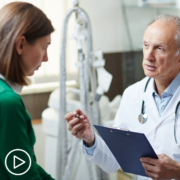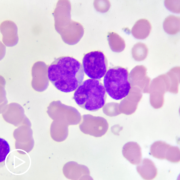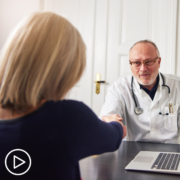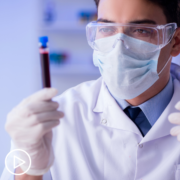How to Be a Partner in Your CLL Care
How to Be A Partner in Your CLL Care from Patient Empowerment Network on Vimeo.
Staying updated about chronic lymphocytic leukemia (CLL) can help patients become partners in their own CLL care. Dr. Susan O’Brien, a Hematology-Oncology specialist, explains how self-advocacy and credible web sites can be useful tools to help patients be active in their care.
Dr. Susan O’Brien is the Associate Director for Clinical Science, Chao Family Comprehensive Cancer Center.
See More From The Pro-Active CLL Patient Toolkit
Related Resources

|
 How Do You Know If Your CLL Treatment is Working? How Do You Know If Your CLL Treatment is Working? |
 What Should You Know About the Future of CLL Treatment? What Should You Know About the Future of CLL Treatment? |
Transcript:
Katherine:
Let’s turn to patient self-advocacy. How can patients feel confident in speaking up and becoming a partner in their own care?
Dr. Susan O’Brien:
Yes, obviously for some people that’s going to be a lot harder than others. What I generally advice people is if you’re going in for your physician and you’re diagnosed with CLL, I would say this for any cancer because cancer is obviously a potentially life changing diagnosis, is you probably want to get an opinion with an expert. I would talk to my doctor first, ask them what they’re plan is so I know, and then see an expert in the field.
Then if the expert in the field says, “I think your doctor’s plan is great.” 1.) you’re now comfortable because you’ve got a second opinion, and 2.) that’s also a way, in my experience, to know if your doctor’s really gonna allow you to have an easy time participating. What I mean by that is that if your doctor is upset or finds it offensive, quite frankly you probably need a new doctor. That’s my take on that. Because that means they’re not going to be too open to your comments or you’re saying, “Well, I would prefer to do this.”
That’s just my quick take on how you can tell if it’s going to be easy or hard. But I think the relationship between the doctor and the patient is very important and you have to establish that relationship early on. If you go to a doctor who – where you start to ask questions and they’re in a hurry or they’re looking at their watch, you know that’s probably not the doctor that you want. I think most doctors realize that if they’re diagnosing a patient with a cancer, that’s going to be a pretty long clinic visit, because any patient is going to have a lot of questions to ask.
I also tell patients when you go to see a specialist or get a second opinion, bring somebody with you. It’s very well known that when patients have just been diagnosed with a cancer, they’re overwhelmed. Their emotional system is overwhelmed. Even if it’s “not a bad cancer”. Maybe early stage CLL. And that makes it very hard to process what a doctor is saying.
Katherine:
Yeah. Yeah. That’s really good advice. Are there resources to help patients stay informed and educated?
Dr. Susan O’Brien: Oh, yes. Our Leukemia and Lymphoma Society is great at that. Lymphoma Research Foundation were two of the big ones. And then there’s patient spots. CLL Society is a very well-known one run by a physician who’s also a CLL patient. I know him very well. And they have online support meetings now.
They used to have them in person, but now they have them online. And those can be really helpful because that allows a patient to talk to another patient who has their same disease. So, there are quite a lot of resources for patients nowadays. Especially in our technology enabled world.
Katherine:
That’s great. We have a couple of questions from patients. Patrick asks, “I’ve discussed a treatment plan with my doctor, but I’d like to get a second opinion. What are your thoughts on that?”
Dr. Susan O’Brien:
I think it’s a great idea. That’s exactly what I would do if I had a cancer. And again, I think Patrick made an important point that I’d like to emphasize. See what your doctor’s plan is first. Because then when you go to see the specialist or the second opinion, you can say, “This is what my doctor’s suggesting.” And then if the specialist says, “Exactly what I would do.” But if you don’t know what your doctor is going to do – was suggesting to do when you go in to see the second opinion, it’s going to be really hard to make sure –put together that feeling of confidence that you’re on the right track.









